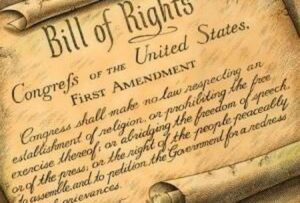NOTE: Last week, on April the sixth, we published an article entitled, America ABANDONS The First Amendment. What you are about to read picks up where the original column left off and posts its own discussion – POINT BLANK. It would appear that the current bunch of scum in the U.S. Congress (collectively) are doing their utmost to attack the entirety of the Bill of Rights. ~ Editor
 Government censorship has shifted to the forefront of American conversation with the recent passing of H.R. 752, which would essentially ban TikTok; this development, which has passed the House and is on its way to the Senate, is igniting debating on how much involvement the government should have in social media.
Government censorship has shifted to the forefront of American conversation with the recent passing of H.R. 752, which would essentially ban TikTok; this development, which has passed the House and is on its way to the Senate, is igniting debating on how much involvement the government should have in social media.
This debate is not new, considering the government has been intervening in social media for years. For example, this is not the first time the federal government has tried to ban TikTok. In 2020, then-President Trump famously attempted to ban the uprising app but was challenged and ultimately blocked by the courts.
With all the commotion concerning government involvement in social media in the federal government’s legislative branch, there is just as much talk happening in the judicial branch. Last week, the United States Supreme Court heard an oral argument in Murthy v. Missouri. The question of this case is whether the federal government had the right to request private social media companies to regulate “misinformation” and take action against said “misinformation” on behalf of the government. Murthy v. Missouri deals explicitly with the government, “targeting conservative-leaning speech on topics such as the 2020 presidential election, COVID-19 origins, mask and vaccine efficacy, and election integrity.”
During the Supreme Court’s deliberation, the most recent appointee to the court, Justice Ketanji Jackson, made comments that raised significant concerns. After presenting a thought experiment to Mr. Aguinaga, who was representing on behalf of the respondents, she stated “So my biggest concern is that your view has the First Amendment hamstringing the government in significant ways in the most important time periods.”
The thought experiment she posed was that if there were a teen challenge going around on the internet of kids across the country jumping out of windows, severely hurting themselves, and even killing themselves, the government would have no choice but to step in and encourage these platforms to take down any content surrounding this trend. This may seem like a case, an extreme one at that, where it would make sense for the government to step in. If there really is an epidemic of kids being at risk due to an online challenge, the populace today would probably understand the government compromising our First Amendment rights to keep kids safe, according to Jackson.

James Madison
The problem with this position and Justice Jackson’s statement is that the First Amendment exists to hamstring the government precisely, even in dire times. We can look to the man who wrote the First Amendment to support this view. “The people shall not be deprived or abridged of their right to speak, to write, or to publish their sentiments; and the freedom of the press, as one of the great bulwarks of liberty, shall be inviolable.” This was the intention behind the First Amendment and what we, as Americans, are guaranteed. The government does not give our rights, they can only be recognized and acknowledged. These rights shall not be infringed no matter what.
The unfortunate reality of the Supreme Court is that it’s an extension of all the presidents who have appointed judges to the court. So even though we know that our rights are not to be infringed, the state will put its interests above all. Murray Rothbard, in his book Anatomy of the State, mentioned that J Allen Smith, former Professor of Political Science at the University of Washington, “… noted that the Constitution was designed with checks and balances to limit any one governmental power, and yet had then developed a Supreme Court with the monopoly of ultimate interpreting power.”
The correct response to Justice Jackson’s thought experiment is that it’s not the government’s responsibility to regulate trends on private social media platforms. For the government to abuse its position as the monopoly of power to intimidate private entities to do what it wants is an abuse of power. If you give the state an inch, they eventually end up with unlimited miles.
Written by Grace Walter for the Mises Institute ~ April 8, 2024
